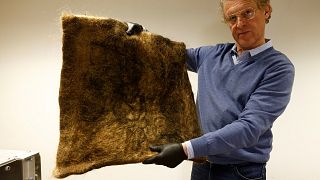This article was contributed by Ruba Hajj of FCC partner Creative Districts
In the pursuit of sustainability, small businesses are increasingly taking the lead in driving innovative initiatives worldwide. While larger corporations often have more resources and influence, it is the agility, adaptability, and entrepreneurial spirit of small businesses that enable them to spearhead transformative changes. This article aims to highlight the key strengths of small businesses that position them as a driving force behind sustainability. The inspiring case study of the HairRecycle project in Belgium will be explored to provide a concrete example of how small businesses can create a ripple effect towards reduced environmental impact.

Why small businesses are at the forefront of sustainability:
Small businesses possess various defining factors that make them potential pioneers in achieving sustainable action and tangible change towards climate impact reduction:
- A small business is flexible and adaptable
Given the smaller size of their operations, small businesses can flexibly adapt to environmental challenges, economic fluctuations, consumer demands and emerging trends. This allows them to stay ahead and respond effectively to sustainability issues.
- A small business is founded on an entrepreneurial mindset
Entrepreneurs and small business owners often possess a strong sense of purpose and a drive to make a positive impact. They are more likely to have direct involvement in decision-making, enabling them to prioritize sustainability, seek innovative solutions and challenge the status quo.
- A small business is at the heart of its local community
Small businesses are deeply rooted in local communities and therefore have personal connections with customers, suppliers, and neighboring businesses. This in turn fosters a sense of responsibility towards the community and environment. By clearly understanding the direct impact of their actions on the local ecosystem, small businesses are more motivated to create positive change.
- A small business can more easily keep up with its customers
Being closer to their customers, small businesses can be more attuned to their preferences and respond to shifts in their demand. As consumers are increasingly prioritizing sustainability within their purchases, small businesses can more easily identify and develop innovative solutions to satisfy this demand.
- A small business is more collaborative
Small businesses have a higher tendency to collaborate with a wide network of organizations and stakeholders to amplify their impact. These collaborations help foster a supportive ecosystem that allow small businesses to learn from each other and create a multiplier effect for sustainability initiatives.
- A small business is more influential
Small businesses have the ability to act as catalysts for influencing wider industry practices particularly when it comes to sustainable initiatives. Small businesses can influence industry standards by setting examples, sharing best practices, and advocating for more sustainable regulations and policies.
The HairRecycle Project: A Belgian success story

What is the HairRecycle project?
The Hair Recycle project tackles the issue of hair waste by repurposing discarded locks and tresses. Rather than allowing hair to contribute to landfill waste, the project collects hair from participating hair salons and feeds it into a machine. This innovative technology transforms hair into matted squares, ready to absorb oil and other hydrocarbons polluting the environment. Additionally, hair can be utilized to create bio-composite bags, further reducing reliance on traditional materials. The project was developed as a family initiative and collaborates with hairdressers all over Belgium to create a ripple effect towards sustainability.
Why is recycling hair essential?
Hair, an often-overlooked waste material, proves to be an effective and eco-friendly solution for environmental pollution. The project recognizes the inherent properties of hair, such as its ability to absorb oil, making it an ideal resource for tackling oil spills and other hydrocarbon-related accidents. According to the project co-founder Patrick Janssen: ‘1 kilogram (2.2 lbs) of hair can absorb 7-8 liters (1.8-2.1 US gallons) of oil and hydrocarbons’ and therefore the mats can be placed in drains to absorb oil spills before reaching rivers. By harnessing the natural qualities of hair, small businesses involved in the project are transforming waste into a valuable resource for environmental remediation.
How does it work?
The project works with a network of hair salons in Belgium who pay a representative membership fee to belong to the ‘sustainable hairdresser’ community. Member salons receive enough bags to collect hair that last a year in addition to a sticker to place on their windows to inform their customers that their hair salon is part of an eco-responsible approach to recycling hair. The project is responsible for regularly collecting and recycling the filled bags.
How are small businesses contributing?
The HairRecycle project underscores the immense potential of small businesses to contribute to sustainability. By actively participating in the project, hair salons of all sizes can divert significant amounts of hair waste from landfills. This collective effort amplifies the impact of individual businesses, showcasing how even seemingly small contributions can drive meaningful change and create a more sustainable future. The project demonstrates the importance of localized solutions to address global environmental challenges. By engaging local hair salons and building a network of participants, the project creates a community-driven approach to waste management. This not only reduces environmental impact but also fosters a sense of shared responsibility and empowerment among small businesses, encouraging their continued commitment to sustainability.
How can others be inspired?
The success of the HairRecycle project extends beyond its direct impact on waste reduction. It serves as an inspiration for other small businesses, encouraging them to seek innovative solutions and contribute to sustainability in their respective industries. The project’s achievements and lessons learned spark a ripple effect, motivating other businesses to explore creative approaches to waste management and reduce their environmental footprint. Moreover, collaborations and partnerships play a crucial role in the project’s success. By forging alliances with hair salons, environmental organizations, and technology providers, the project creates a holistic approach that leverages the strengths of various stakeholders. These collaborations facilitate knowledge sharing, resource pooling, and the development of sustainable practices, further enhancing the project’s impact and potential for replication.





